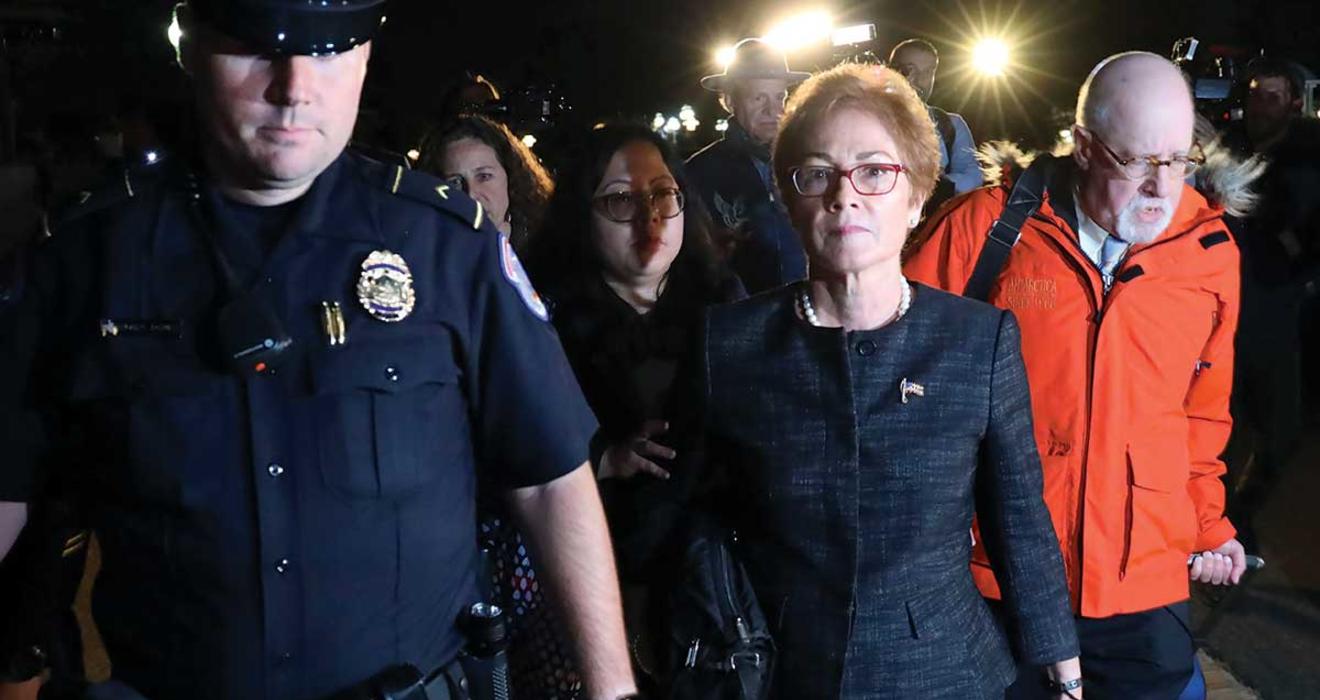
The Calm After the Storm
Former Ambassador Marie Yovanovitch ’80 reflects on her moment of decision
One morning in early March, Marie “Masha” Yovanovitch ’80 walked down the street to her neighborhood coffee shop in Alexandria, Virginia, blessedly anonymous, blessedly alone.
More than two years ago, Yovanovitch — who’d recently been forced from her job as U.S. ambassador to Ukraine — had her photo on the front page of every newspaper in the country. In two congressional appearances, the first before House investigating committees and the second in the impeachment inquiry that followed, Yovanovitch had braved cameras and television lights, her stark account of President Donald Trump’s actions becoming the lead story on every newscast. Trump called her “bad news,” publicly bashing her while she was testifying, and she endured the surreal experience of seeing herself portrayed on Saturday Night Live. Her 90-year-old mother, who had lived with her at the U.S. embassy in Kyiv, died during the impeachment inquiry, which Yovanovitch attributes in part to worry about the attacks against her daughter. Google her name even today, and you will find T-shirts for sale with her image and captions such as “Strong Woman” and “Marie Yovanovitch Persisted.”
Ukraine, of course, is back in the news, but Yovanovitch, to her relief, is not — except on her own terms. She is now a fellow at Georgetown’s Institute for the Study of Diplomacy and the Carnegie Endowment for International Peace, which are perhaps as far off the front pages as it is possible to get in public service. In recent weeks, she has given press interviews and appeared on television shows, including The Late Show with Stephen Colbert, to promote her new book, Lessons From The Edge: A Memoir, and to comment on Ukraine. But Yovanovitch is by nature an introvert, one who speaks carefully and prefers to bump elbows rather than shake hands, at least until the pandemic is over.
Her recent publicity tour notwithstanding, Yovanovitch says that people rarely recognize her anymore. Changing her look — her short, reddish hair is now silver and long — and wearing a mask because of COVID help with anonymity, she jokes. But being out of the limelight suits her fine. In the fall of 2019, of course, things were different. Party-goers spontaneously broke into applause when she entered a restaurant, and a marine biologist asked to name a dolphin after her. The experience, she told her brother, was like attending her own funeral.
One of the uglier features of modern life is what might be called the media maelstrom — that frenzy in which an unsuspecting person is picked up, like Dorothy in The Wizard of Oz, and spun around in a tornado, every detail of their past scrutinized, every quote amplified or distorted, and their character reduced to simple verdict of Good or Bad. After a few tumultuous days or weeks, the maelstrom spits them out and moves on. Yovanovitch is one of the unlucky few who knows what that experience is like.
“It’s frightening,” she says quietly, “because there’s not much you can control except yourself, to the extent that you can even do that.”
“The more I thought about it,” she explains now, “the more I realized that my greater responsibility — I think all of our greater responsibilities — is to the Constitution.”
The details of Yovanovitch’s firing as ambassador in May 2019 and the impeachment investigation that followed have already become, as The Washington Post’s review of her book put it, like “reliving a bad dream.”
She had returned to Kyiv as the ambassador in 2016 (after previously serving there as deputy chief of mission) to advance the U.S. policy goals of promoting democracy and urging the Ukrainian government to root out corruption. Indeed, one feature common to many of the countries where Yovanovitch was posted was the lack of legal safeguards to prevent leaders from putting their own interests ahead of their country’s. Eventually, she writes, she came to see those threats emerge in her own country, as well.
Yovanovitch’s parents fled the Soviets and the Nazis. She was born in Canada, moved to Connecticut as a child, and received American citizenship when she was 18. At Princeton, she majored in history but describes her undergraduate years as a time of finding herself; she lived off campus and even missed her thesis deadline, graduating late. She later earned a master’s degree from the National War College. After exploring a few other career paths, including working as a waitress and a secretary, she joined the Foreign Service in 1986.
Although her fluency in Russian would eventually come in handy, Yovanovitch’s first postings were to Somalia and Great Britain; like most foreign service officers, she rotated assignments every few years. Yovanovitch writes about the petty harassment women faced in the male-dominated Foreign Service, noting that even as late as her retirement in 2020, the women’s restrooms in the State Department still had urinals. Initially stuck doing clerical work rather than policy analysis, Yovanovitch benefitted from an ongoing class-action lawsuit that led the State Department to give 14 female Foreign Service officers the opportunity to select their next assignment. Yovanovitch applied and was one of those chosen. In 1993, she was posted to Moscow to work on political matters.
Yovanovitch’s first ambassadorial assignments a decade later, to Kyrgyzstan (2004 to 2008) and Armenia (2008 to 2012), were not glamorous, but the two former Soviet republics were politically sensitive posts where Yovanovitch earned a reputation for competence and clear judgment. As planned, she had returned to Washington to be the principal deputy assistant secretary for the Bureau of European and Eurasian Affairs when she was nominated and confirmed to be U.S. ambassador to Ukraine in the waning months of the Obama administration.
Having served under presidents of both parties, Yovanovitch assumed she could continue to serve the country in the Trump administration, but she quickly made enemies, both in Kyiv and, to her shock, in Washington.
Incensed at Yovanovitch’s commitment to rooting out Ukrainian corruption and her refusal to go along with the Trump administration’s search for dirt on Hunter Biden, a tag team of Rudy Giuliani, a Ukrainian prosecutor, and their associates conducted a smear campaign against her for more than a year. In April 2019, Yovanovitch was recalled to Washington and told that the president “had lost confidence in her.” A State Department official suggested that she try to regain Trump’s favor by publicly affirming her loyalty to him, but Yovanovitch refused, believing that it was inappropriate for a nonpartisan civil servant to do such a thing and that her only loyalty was to the Constitution and the national interest. Trump formally relieved her as ambassador on May 20.
Her story might have died there except that the following August, a whistleblower in the White House flagged a conversation Trump had with the new Ukrainian president, Volodymyr Zelenskyy. Trump began by disparaging Yovanovitch and ended by appearing to hold up the release of missiles necessary for Ukrainian defense unless Zelenskyy announced an investigation of the Bidens. The suggestion that the president was subverting government policy to his own political interests led to a congressional investigation and Trump’s impeachment.
The White House and the State Department did not want Yovanovitch or anyone else to testify. Gordon Sondland, the U.S. ambassador to the European Union, followed directions and defied a congressional subpoena, though he would testify later. What would Yovanovitch do?
Yovanovitch says she hated being caught in a partisan political fight. She also worried about the personal consequences of defying the administration. Would she be stripped of her pension? Could she face prosecution? Trump had ominously warned Zelenskyy that she was “going to go through some things.” What might those things be?
Struggling with her decision, striving to care for her ailing mother, and worried about her professional reputation and her future, Yovanovitch began seeing a psychiatrist, asking if she might be suffering from post-traumatic stress disorder. (No, the psychiatrist said; her traumatic stress was still ongoing.) “I had thrived in a series of pressure-filled environments …,” she writes in her memoir. “But here I was, huddled on a couch, barely holding it together as a result of my own government’s actions.”
She was supported by her brother and niece (who explained what a “badass” was after a fan called Yovanovitch that on social media), as well as old friends, including two of her Princeton roommates, who call themselves the “yoga girls.” Yovanovitch knew that she had a duty to testify. But she also retained her own lawyers.
“The more I thought about it,” she explains now, “the more I realized that my greater responsibility — I think all of our greater responsibilities — is to the Constitution. And so, by the end, there was nothing else that I could do. If the committee wanted to call me, then I had to go and share what I knew.” As Yovanovitch prepared to face the investigators, she wrote in block letters at the top of her notes, “THE TRUTH IS ON MY SIDE.”
Yovanovitch’s first appearance, before three House investigating committees, was held Oct. 11, 2019, in a secure room in the Capitol, although a transcript was soon released. When the House began formal impeachment proceedings against Trump, she reprised her testimony Nov. 15 in a nationally televised hearing. While laying out the facts and defending her record, Yovanovitch also went out of her way to defend her fellow Foreign Service officers, whom she called “the best our country has to offer.”
“This is not the time to undercut our diplomats,” she stated. “It is the responsibility of the department’s leaders to stand up for the institution and the individuals who make that institution the most effective diplomatic force in the world.”
Anne-Marie Slaughter ’80, former dean of the School of Public and International Affairs who served as director of policy planning in the State Department, calls Yovanovitch’s decision to testify a pivotal moment in exposing the administration’s misconduct, likening it to Elliot Richardson’s refusal to fire special prosecutor Archibald Cox during Watergate. “If she had rolled over, I don’t know how long it would have taken for the various machinations of Trump and Giuliani and others in Ukraine to come out,” Slaughter says.
Almost as important, Slaughter continues, Yovanovitch’s defense of her fellow civil servants provided a much-needed boost to State Department morale. “The Foreign Service is apolitical,” she says. “They’re just like the military — they serve the country. Masha certainly reflected the best of the Foreign Service.”
Through hours of cross-examination across two congressional hearings, Yovanovitch’s cool demeanor and defense of a professional and unbiased Foreign Service won her widespread praise. A laudatory profile in Vanity Fair was headlined, “A hero is born.”
A hero, however, was not what Yovanovitch ever wanted to be. A few months later, she retired from the Foreign Service, though even now, she still reflexively calls the State Department “we.” In February 2020, Georgetown University’s Institute for the Study of Diplomacy honored her with its award for Excellence in the Conduct of Diplomacy, conferring a small but appreciated professional commendation after Trump’s attacks on her record. She has since joined the Carnegie Endowment for International Peace, written her memoir, and tried to get her life back to normal.
Following her dismissal as ambassador, Yovanovitch moved back to Alexandria, to a house she had purchased in the 1990s. “I bought it partly because I always wanted to know where ‘home’ was,” she explains. When she returned to the United States, “it was nice to know that I had a place that was mine, and a neighborhood that I knew, and neighbors who were supportive friends.”
That sort of grounding is difficult for career Foreign Service officers to find, and the State Department’s difficulty in attracting and retaining people has become a problem. During her own career, Yovanovitch moved 13 times and served in seven different countries, five of which were considered “hardship posts.” Like many daughters, she took on responsibility for caring for her aging mother and says she was torn about taking the job as ambassador to Ukraine until she was sure her mother could go with her. Compared to previous generations, fewer young people are willing to pursue a career path like that, one that also makes it difficult for Foreign Service spouses to hold jobs and for their children to stay in school.
“I just don’t see the number of spectacular young people across the country signing up for a 30-year career in the ways that many Princetonians [once] did,” Slaughter worries. Or as Yovanovitch puts it, “We can’t have the model of the 1950s, where it’s a male Foreign Service officer with a spouse who is endlessly supportive.” Indeed, a 2021 study by Georgetown and Harvard researchers described a “retention crisis” at the State Department and found that nearly a third of current officers were considering leaving the Foreign Service. The primary driver of attrition, the report said, was lifestyle choices.
Looking back at her own experience, Yovanovitch reflects that her time in the maelstrom has not changed her as much as it has changed some of those around her. “People tend to see me differently,” she observes, “and it is not always the way I see myself.” What she means is, they tend to boil her career down to those few tumultuous weeks in the headlines — to reduce her, in other words, to the figure on those T-shirts. They don’t see the unglamorous but essential work she did during three decades of public service.
What, then, did Yovanovitch learn from her time on the edge? One thing is the truth of the adage that freedom isn’t free. “You need to work for it,” she says. “We need to protect institutions and put honest people into important jobs.” She continues to extol the importance of diplomacy, expertise, honesty, and objective policy analysis.
With a new life and career before her, Yovanovitch says she wants to work with young people, instilling in them the same ethos of public service that was drummed into her at Princeton. “While it’s easy now to be cynical about the United States and not want to be part of government, that can’t be the answer,” she says, growing animated. “The answer has to be, if you’re not happy with something, you need to get in there and fix it. Democracy needs to be tended and defended if we want to preserve it. And that takes all of us.”
There is one other thing Yovanovitch has learned — and this about herself. Most of us wonder what we would do if we found ourselves caught in the maelstrom. Would we do the right thing? Would we tell the truth? Or would we keep our head down and avoid trouble?
As she wrestled with her decision to testify, Yovanovitch writes, she kept thinking back to an old hymn she had sung in prep school:
Once to every man and nation comes the moment to decide,
In the strife of Truth or Falsehood, for the good or evil side.
Now that the storm has passed, Marie Yovanovitch can walk home, recognized by no one, but knowing that she has met that moment and has her answer.
Mark F. Bernstein ’83 is PAW’s senior writer.


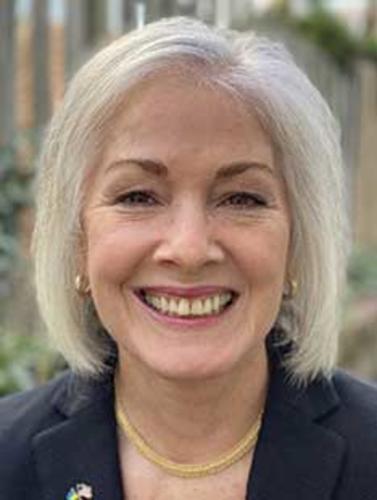
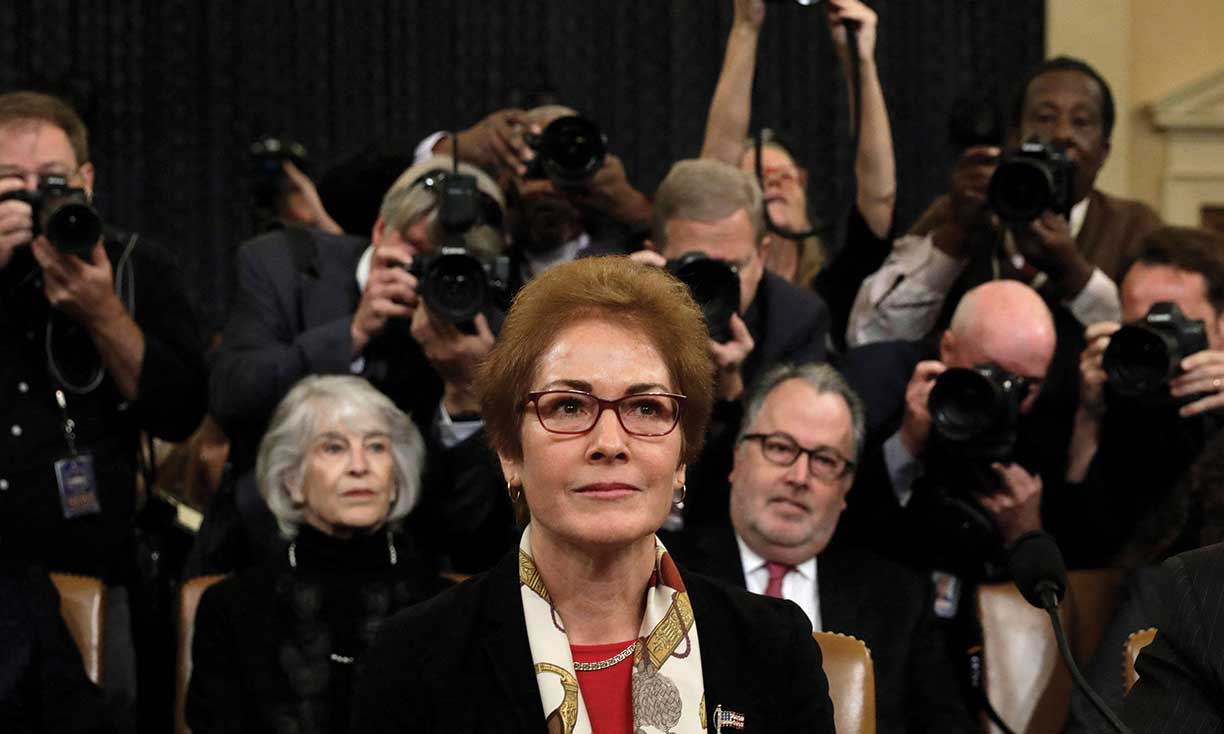
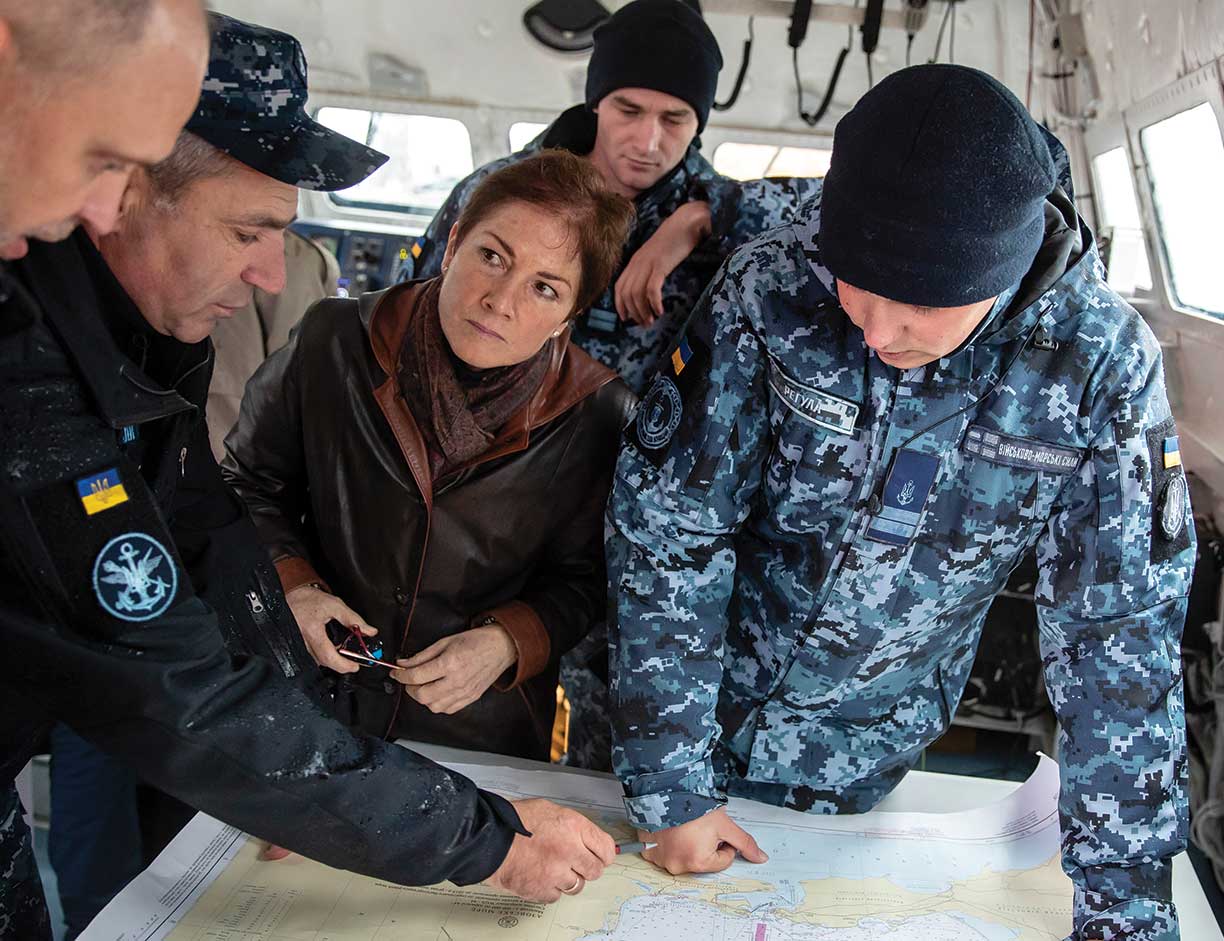
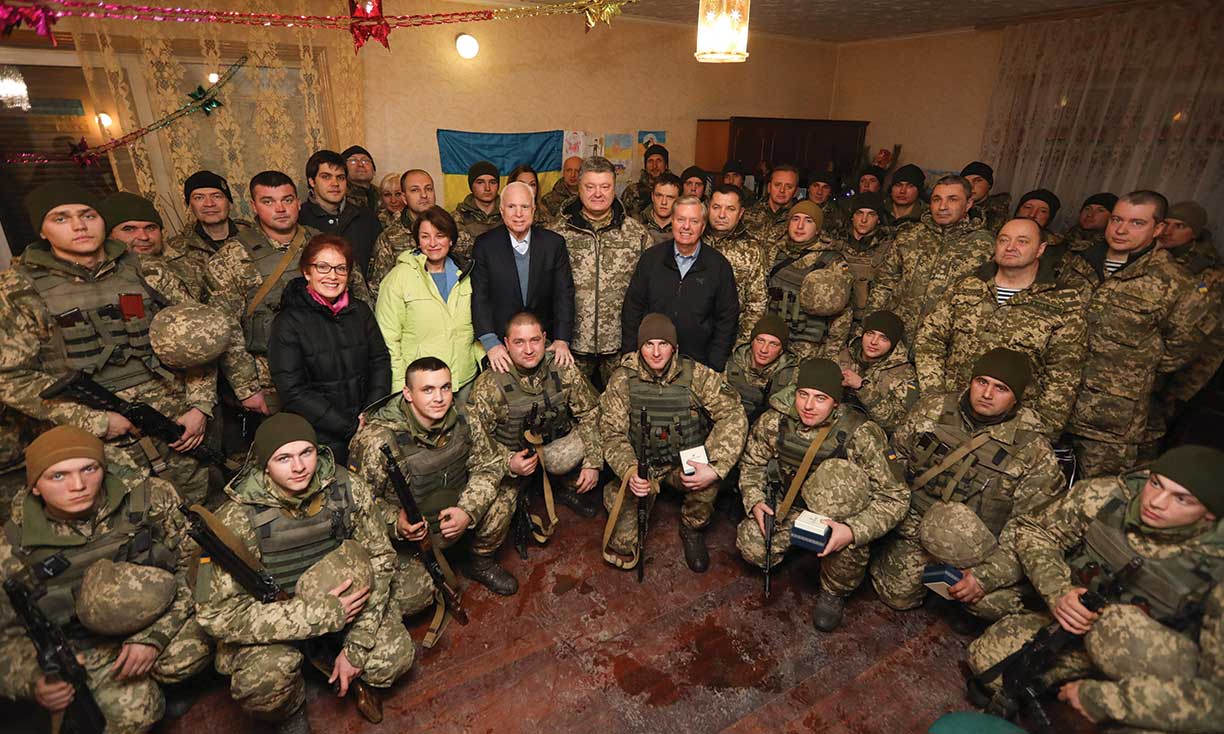




12 Responses
Tish Callanan
1 Year AgoThank You, Marie Yovanovitch, and Thank You PAW
I was just watching a C-SPAN televised panel discussion on Ukraine with former ambassadors to Ukraine which included Ms. Yovanovitch. Afterward, I did a google search of her and found this article. Excellent. Well written. Informative.
Thank you bringing me up to date on a woman whose courage I admire tremendously.
I served with the Peace Corps in Brazil and was director of World Boston, which administers the State Department’s International Visitor Program and the Russian Community Connections Program. I’m 79 years old.
Your article lifted my spirits! Commitment to integrity, honesty, service to our country and constitution are values that are very important in the difficult times we live in.
I will definitely get her book. Again, thank you.
J. Kay Flanery
3 Years AgoLessons from the Edge
I’m reading Marie Yovanovitch’s book (via audio) and find it both educational as well as insightful for the leadership skills she demonstrates and explains — a great example of women rising to leadership in a male dominated world. I am sharing it with many developing female leaders within my network!
James R. Cole ’61
3 Years AgoFamiliar Visage of Strength
Many thanks for your article concerning Ambassador Marie Yovanovitch ’80. Your cover picture brought to me the same visage I saw when she took a long televised walk to the conference room where she was questioned. I saw in that face a person of great dignity, strength, and composure. I’ll not forget that image.
Susanna Badgley Place ’75
3 Years AgoRemarkable Memoir, the Best of Princeton in the Nation’s Service
I recommend listening to Marie Yovanovitch ’80 (“The Calm After the Storm,” May issue), former U.S. ambassador to Ukraine, narrate her personal and professional life journey in her memoir, Lessons from the Edge (audiobook version). On the cutting edge of momentous international events, including the making and unraveling of governments from Somalia to Ukraine, Yovanovitch was also on the leading edge of women serving in the U.S. State Department and civil society abroad. As we consider how close American institutions have come to being subverted by lies, willful ignorance, and insurrection by Trump and his mafia, we at Princeton can be immensely proud of Yovanovitch for summoning the courage to speak truth to corruption and to embolden others to follow her example.
Norman Ravitch *62
3 Years AgoA Heroine
So few of those in the Trump misadministration had the courage Ms. Yovanovitch showed. Trump’s helpers were either chosen for their lack of virtue or they quickly saw where the money was and did his bidding.
Murphy Sewall ’64
3 Years AgoIn the Nation’s Service
Hurrah for Marie Yovanovitch ’80 for embodying “Princeton in the Nation’s Service” that I hope is repeated as often on campus as it was 60 years ago.
George Lambrakis ’52
3 Years AgoAmbassador Yovanovitch and Diplomat Memoirs
Bravo for a nice article on fellow diplomat Marie Yovanovitch. It covers the sensitive elements, not just the successes. There are a dozen or more U.S. Foreign Service memoirs published yearly. Most are not about anyone who has hit the front pages like Yovanovitch, but it is interesting to see American diplomacy becoming attractive to Princeton graduates and other young people once again, as in the 1950s, after the years of American security following the fall of the USSR. Please don’t make this the last one.
Editor’s note: Lambrakis is the author of So You Want to be a Diplomat? (2019).
Susan Patton ’77
3 Years AgoApolitical Foreign Service?
“The Foreign Service is apolitical” is no more true than saying the PAW is apolitical. A total fiction.
Doug Hensler ’69
3 Years AgoFame vs. Anonymity
“Changing her look — her short, reddish hair is now silver and long — and wearing a mask because of COVID help with anonymity, she jokes. But being out of the limelight suits her fine.”
Seems to me that Ambassador Yovanovitch’s assent to an article about her trials, a book tour and television appearances aside, belies her stated desire for anonymity, placing her back in the limelight, favoring fame instead.
Charles Stone ’76
3 Years AgoCorruption in Ukraine
One wonders if Ambassador Yovanovitch finds the Biden family corruption in Ukraine to be worrisome.
Alexander Wellford Jr. ’64
3 Years AgoTimely Article on U.S. Ambassador to Ukraine
It seems so long ago that Donald Trump removed her from office as the Ambassador to Ukraine, with no other apparent reason that she refused to do the bidding of Trump’s team to get dirt on Hunter Biden. One wonders where Ukraine would be now if Trump was still president. Excellent, timely article.
Matt Miller *74
3 Years AgoAlumni Expertise
We should get Marie Yovanovitch ’80 and Julia Ioffe ’05 together, either on a live panel or in extended two person interview, to discuss post-Soviet Russia, Eastern Europe, Ukraine, and their many other areas of extraordinary experience and expertise.
A bit late to organize, but how about at Reunions this year? Special topical session.